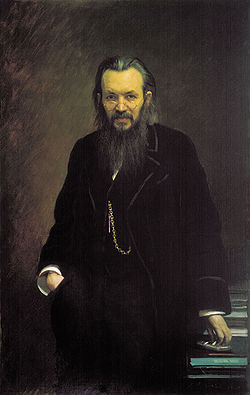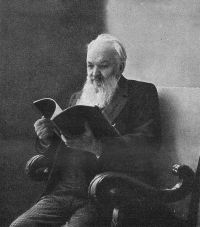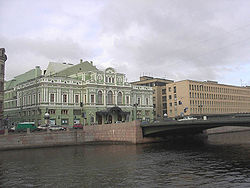
Aleksey Suvorin
Encyclopedia

Voronezh
Voronezh is a city in southwestern Russia, the administrative center of Voronezh Oblast. It is located on both sides of the Voronezh River, away from where it flows into the Don. It is an operating center of the Southeastern Railway , as well as the center of the Don Highway...
— 11 August 1912, Tsarskoye Selo
Tsarskoye Selo
Tsarskoye Selo is the town containing a former Russian residence of the imperial family and visiting nobility, located south from the center of St. Petersburg. It is now part of the town of Pushkin and of the World Heritage Site Saint Petersburg and Related Groups of Monuments.-History:In...
) was an immensely rich newspaper and book publisher and journalist
Journalist
A journalist collects and distributes news and other information. A journalist's work is referred to as journalism.A reporter is a type of journalist who researchs, writes, and reports on information to be presented in mass media, including print media , electronic media , and digital media A...
whose publishing empire wielded considerable influence during the last decades of the Russian Empire
Russian Empire
The Russian Empire was a state that existed from 1721 until the Russian Revolution of 1917. It was the successor to the Tsardom of Russia and the predecessor of the Soviet Union...
.
He set out as a liberal journalist but, as many of his contemporaries, experienced a dramatic shift in views, gradually drifting towards nationalism.
Early career
Suvorin was a quintessential self-made man. Born of a peasant family, he succeeded in gaining access to a military school at VoronezhVoronezh
Voronezh is a city in southwestern Russia, the administrative center of Voronezh Oblast. It is located on both sides of the Voronezh River, away from where it flows into the Don. It is an operating center of the Southeastern Railway , as well as the center of the Don Highway...
, from which he graduated in 1850. In the following year he arrived in St. Petersburg and joined a major artillery school there. With limited prospects of pursuing a military career, he spent eight years in his native haunts, teaching history and geography, first in Bobrov
Bobrov, Russia
Bobrov is a town and the administrative center of Bobrovsky District in central Voronezh Oblast, Russia, located on the right bank of the Bityug River, southeast of Voronezh. Population:...
, and then in Voronezh. No one could have predicted that, within two or three decades, this provincial teacher would rise to become one of the most influential men in the empire.
A major step forward in his career was in 1861, when, electrified by the Emancipation Manifesto, he relocated to Moscow
Moscow
Moscow is the capital, the most populous city, and the most populous federal subject of Russia. The city is a major political, economic, cultural, scientific, religious, financial, educational, and transportation centre of Russia and the continent...
, where he found himself at the periphery of a burgeoning literary scene. At first money was tight, instigating Suvorin to move to St. Petersburg, where he joined the staff of the St. Petersburg Vedomosti, an influential newspaper with liberal leanings. He soon became its leading contributor and secretary to the editor-in-chief. Suvorin's feuilleton
Feuilleton
Feuilleton was originally a kind of supplement attached to the political portion of French newspapers, consisting chiefly of non-political news and gossip, literature and art criticism, a chronicle of the latest fashions, and epigrams, charades and other literary trifles...
s, published under the pen-name "Stranger", were an instant sensation and inspired him to turn his attention to more creative writing.
Publishing
Suvorin's personality as a writer is somewhat overshadowed by his journalism. Nevertheless, he was very prolific, publishing a number of short stories and plays in the major outlets of the liberal media, of which he was considered a leader. Capitalizing on this success, Suvorin set up a publishing venture in 1871. Among his first publications was the Russian Calendar, which was in high demand all over Russia, followed by an unprecedented series of cheap editions of classics, both foreign and Russian. For more demanding readers, he issued a suite of richly illustrated albums about the great art galleries of Europe.In the late 19th century Suvorin launched a series of city directories
Address book
An address book or a name and address book is a book or a database used for storing entries called contacts. Each contact entry usually consists of a few standard fields...
which were published on an annual basis (each were between 500 to 1500 pages long) for Saint Petersburg
Saint Petersburg
Saint Petersburg is a city and a federal subject of Russia located on the Neva River at the head of the Gulf of Finland on the Baltic Sea...
, Moscow
Moscow
Moscow is the capital, the most populous city, and the most populous federal subject of Russia. The city is a major political, economic, cultural, scientific, religious, financial, educational, and transportation centre of Russia and the continent...
and all of Russia
Russia
Russia or , officially known as both Russia and the Russian Federation , is a country in northern Eurasia. It is a federal semi-presidential republic, comprising 83 federal subjects...
detailing the names and addresses of private residents, government offices, public services and medium and large businesses. They are often referred to as the Suvorin directories from the publisher's name. These directories are often used by modern genealogists to trace family members who lived in Imperial and early Soviet Russia when vital records are missing or prove difficult to find. Historian
Historian
A historian is a person who studies and writes about the past and is regarded as an authority on it. Historians are concerned with the continuous, methodical narrative and research of past events as relating to the human race; as well as the study of all history in time. If the individual is...
s use them to research the social histories of late 19th century and early 20th century Russia.
By the end of the century, Suvorin's bookstores were everywhere — in Moscow, St. Petersburg, Kharkov, Odessa
Odessa
Odessa or Odesa is the administrative center of the Odessa Oblast located in southern Ukraine. The city is a major seaport located on the northwest shore of the Black Sea and the fourth largest city in Ukraine with a population of 1,029,000 .The predecessor of Odessa, a small Tatar settlement,...
, Rostov
Rostov-on-Don
-History:The mouth of the Don River has been of great commercial and cultural importance since the ancient times. It was the site of the Greek colony Tanais, of the Genoese fort Tana, and of the Turkish fortress Azak...
, Saratov
Saratov
-Modern Saratov:The Saratov region is highly industrialized, due in part to the rich in natural and industrial resources of the area. The region is also one of the more important and largest cultural and scientific centres in Russia...
. He held a monopoly on the distribution of printed matter on the railway stations and trains and was probably the most influential publisher in the country.
Novoye Vremya

Novoye Vremya (newspaper)
Novoye Vremya was a Russian newspaper published in St. Petersburg from 1868 to 1917. Until 1869 it came out five times a week; thereafter it came out every day, and from 1881 there were both morning and evening editions...
("New Times"), of which he remained editor-in-chief until his death. Four years later he founded a reputable historical journal, Istorichesky Vestnik. Suvorin confessed to favour the newspaper over his family and worked hard to expand its circulation. By the end of the 1880s Novoye Vremya counted as one of the most profitable and up-to-date enterprises in the Russian publishing industry.
This venture brought him an opportunity of influencing the younger generation with his conservative and increasingly reactionary pronouncements in the vein of Mikhail Katkov
Mikhail Katkov
Mikhail Nikiforovich Katkov was a conservative Russian journalist influential during the reign of Alexander III.Katkov was born of a Russian government official and a Georgian noblewoman...
and Konstantin Pobedonostsev
Konstantin Pobedonostsev
Konstantin Petrovich Pobyedonostsyev was a Russian jurist, statesman, and adviser to three Tsars...
. Novoye Vremya enthusiastically supported the policies of anti-Semitism
Anti-Semitism
Antisemitism is suspicion of, hatred toward, or discrimination against Jews for reasons connected to their Jewish heritage. According to a 2005 U.S...
and Russification
Russification
Russification is an adoption of the Russian language or some other Russian attributes by non-Russian communities...
promoted by the government of Alexander III
Alexander III of Russia
Alexander Alexandrovich Romanov , historically remembered as Alexander III or Alexander the Peacemaker reigned as Emperor of Russia from until his death on .-Disposition:...
. During Suvorin's declining years, Vasily Rozanov
Vasily Rozanov
Vasily Vasilievich Rozanov was one of the most controversial Russian writers and philosophers of the pre-revolutionary epoch. His views have been termed the "religion of procreation", as he tried to reconcile Christian teachings with ideas of healthy sex and family life and not, as his adversary...
and several other popular journalists of his newspaper were allowed considerable discretion in airing their idiosyncratic views. They pioneered a new style of adversary journalism which frequently bordered on personal attacks.
Suvorin's intense dislike of reform and reformers was deeply entrenched: back in 1873, his first wife had been shot dead by her lover, a liberal officer who proceeded to commit suicide. Another influence was Fyodor Dostoyevsky, with whom he was on close terms, especially during the last year of the novelist's life. Suvorin was succeeded at the helm of the family business by one of his sons. His grave is in the Alexander Nevsky Lavra
Alexander Nevsky Lavra
Saint Alexander Nevsky Lavra or Saint Alexander Nevsky Monastery was founded by Peter I of Russia in 1710 at the eastern end of the Nevsky Prospekt in St. Petersburg supposing that that was the site of the Neva Battle in 1240 when Alexander Nevsky, a prince, defeated the Swedes; however, the battle...
.
Suvorin Theatre

Anton Chekhov
Anton Pavlovich Chekhov was a Russian physician, dramatist and author who is considered to be among the greatest writers of short stories in history. His career as a dramatist produced four classics and his best short stories are held in high esteem by writers and critics...
when the latter was an aspiring journalist and became one of his few intimates. Their extensive correspondence is captivating reading. It illustrates the evolution of Chekhov's views on all aspects of Russia's life over the years. It has been noted that Chekhov was so blinded by his affection towards Suvorin that he wrote a one-act sequel to his anti-Semitic play.
By the second half of the 1890s, when Chekhov finally distanced himself from Suvorin, the latter had plunged headlong into theatre. With secure financial backing, he launched his own stage company in 1895. His powerful connections allowed him to get the censorship lifted on Tolstoy
Leo Tolstoy
Lev Nikolayevich Tolstoy was a Russian writer who primarily wrote novels and short stories. Later in life, he also wrote plays and essays. His two most famous works, the novels War and Peace and Anna Karenina, are acknowledged as two of the greatest novels of all time and a pinnacle of realist...
's The Power of Darkness, which was premiered at his theatre. Before long Suvorin's predilection for controversial pieces made his theatre unpopular with liberal elites. At the opening night of The Sons of Israel (1900), "the actors were pelted with apples, galoshes, and other missiles".
The reputation of Suvorin's theatre was so negative that, after completing The Cherry Orchard
The Cherry Orchard
The Cherry Orchard is Russian playwright Anton Chekhov's last play. It premiered at the Moscow Art Theatre 17 January 1904 in a production directed by Constantin Stanislavski. Chekhov intended this play as a comedy and it does contain some elements of farce; however, Stanislavski insisted on...
, Chekhov wrote to his wife that he would not give the play to Suvorin even if he offered him 100,000 roubles and that he despised Suvorin's establishment. Despite the negative publicity, the company survived its founder and continued to operate profitably until the Russian Revolution
October Revolution
The October Revolution , also known as the Great October Socialist Revolution , Red October, the October Uprising or the Bolshevik Revolution, was a political revolution and a part of the Russian Revolution of 1917...
under the name Maly Imperial Theater (Малый Императорский Театр). In retrospect, it appears to have been "the most important private theatre in St. Petersburg".
Since 1920 the building of the theater at 65 Fontanka
Fontanka
Fontanka is a left branch of the river Neva, which flows through the whole of Central Saint Petersburg, Russia. Its length is 6,700 meters, its width is up to 70 meters, and its depth is up to 3,5 meters. The Fontanka Embankment is lined with the former private residences of Russian nobility.This...
Embankment became the home of Bolshoi Drama Theater (now known as Tovstonogov Drama Theater).

